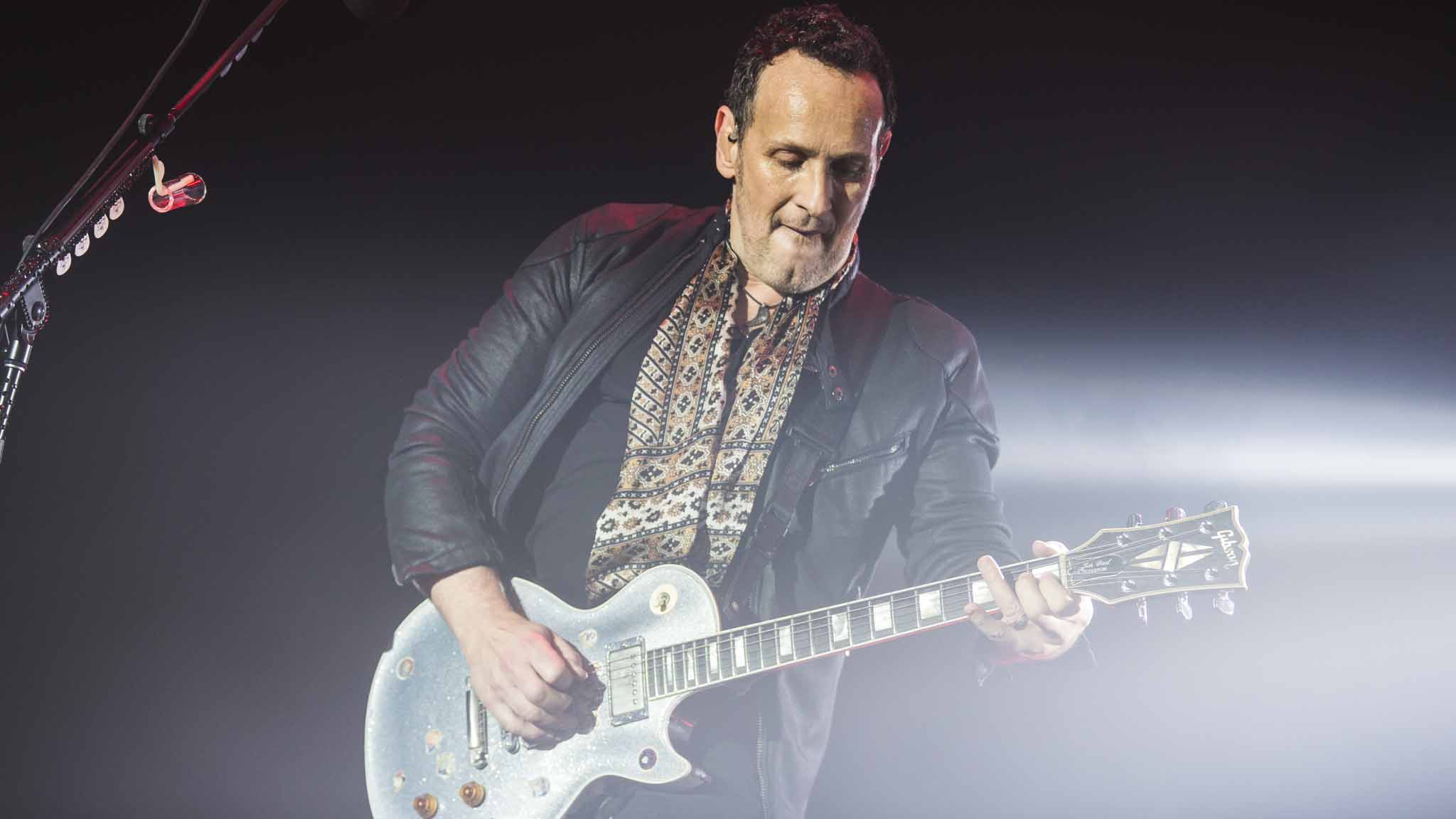Def Leppard and Last In Line's Vivian Campbell: my top 5 tips for guitarists
Former Dio guitarist on gear and technique

Introduction
On 23 January 2016, Last In Line drummer Vinny Appice posted a statement confirming the tragic death of his bandmate Jimmy Bain. The fact that the pair – who played together in the early, classic line-up of the Dio band with guitarist Vivian Campbell – had reconnected almost three decades since their original stint together is especially heartbreaking.
The Scottish bass player’s passing came just weeks before the release of Last In Line’s debut album, Heavy Crown, leaving the band’s future in question. Just before Christmas, we spoke to Vivian Campbell about how excited he was about the old/new project…
“We only have a short window of time to tour this record,” said the Belfast-born guitarist. “Mainly March, April and May while [other band] Def Leppard are dormant. I really want to play more shows with Last In Line. That’s really important to me because I believe in this record.
“The sound of a band comes from the chemistry of the individuals; that’s why those early Dio records sounded so great. Obviously Ronnie James Dio was a very iconic singer, his name was the band, but we created those records as a unit – four different people working together to the same goal.”
The tensions that grew between Dio and Campbell – eventually forcing his exit in 1986 – have been well documented, but the guitarist was quick to point out that he’s eventually found peace with his part in the Dio band history…
“It was unfortunate that by the time we got to the third record the mood had changed,” he continues.
We have every right to play that music and celebrate it
“Wendy Dio [Ronnie’s ex-wife and manager] never wanted it to be a band and drove a wedge between him and the rest of us. History has proven that was a foolish choice.
“It’s taken me a long time to reclaim ownership of this, but it left such a bad taste in my mouth. The way I was fired and the way they portrayed me as someone that turned their back on the band. I didn’t want to leave, I was fired in the middle of a tour.
“So I didn’t listen to those records for decades. I wanted nothing to do with Dio. And maybe it’s because Ronnie passed away… the fact he was no longer here allowed me to reconnect with Jimmy and Vinny. I realised that it’s as much our heritage as it was his. We have every right to play that music and celebrate it.”
Here, Vivian Campbell gives us five tips on becoming a better guitarist…
Last In Line’s debut album Heavy Crown is released by Frontiers Music SRL on Friday 19 February. The band features three original DIO founding members Vivian Campbell (guitar), Vinny Appice (drums), Jimmy Bain (bass), and Andrew Freeman (lead vocals). Official website: www.lastinlineofficial.com
Don't Miss

1. Be more unique than technically proficient
“Uniqueness is what makes you an individual… it’s what appeals to human nature. I didn’t have a choice – I was completely self-taught! We tend to get locked into our early influences, and my early ones were Rory Gallagher and Gary Moore; they both played with a very heavy right hand. A lot of palm-muting and that kind of stuff.
“So when I got into LA and discovered Paul Gilbert and Yngwie Malmsteen, I wished I could learn to play like that… but I couldn’t. The heavy downstrokes were already cemented in me; my touch was too heavy to go back and learn how to do that whole butterfly speed-picking thing.
“Ultimately, it’s fine. I used to get frustrated I couldn’t play like that, but now I’m very at peace with my playing and what I’m capable of.”

2. Don't rely on gear
“Some young guitar players genuinely believe it’s all about the gear. But your tone is all in your hands. When I’m in the studio with Def Leppard, Phil might pick up my Les Paul and start playing through my amp to show me an idea… and he’ll sound like Phil, nothing like me. Likewise, when I play through his rig, it sounds like me.
“A guitar player’s tone very much comes from how they lay their hands on the instrument. It’s not really about the guitar, pickups, amps or whatever… it’s mostly in your right hand: the angle of attack to the strings, how far you are from the bridge, how much you’re palm muting. And then obviously there’s your vibrato in your left hand. I play more legato style than Phil, who tends to pick a lot of notes.
“Less is more: you want less shit between your guitar and your amp to make your tone come out. When we recorded Holy Diver, I had just one guitar… my black Gibson Les Paul 72987537. Which is the only guitar I know the serial of, ha ha!
“My rig in Last In Line is so simple: usually just a cable in between my guitar and amp… the antithesis of my rig with Def Leppard! In that band, I have a massive rack of stuff and no idea how it all works… but it’s necessary for Leppard. For Last In Line, I prefer the pure and simple approach, a lot less shit in between.”

3. Play up to your idiosyncrasies
“Everyone is unique in their voice and how they speak. Your guitar playing voice is no different. When I got to LA in the 80s, all these guitar players had amazing technique. Everywhere I looked, there were absolute shredders! And it damaged my confidence a lot, because before I got to LA, I thought I was a pretty good guitar player.
“I couldn’t understand why Ronnie hired me when he had all these magnificent, proficient guitar players on his doorstep. It took me a while to realise so many of them sounded the same. In the quest for perfect technique, they lost their personality and voice. I couldn’t tell one from the other.
“George Lynch was an exception; I can always tell when it’s him. Even though he’s a real shredder, he has that sliding vibrato that stands out. It’s more important to have personality than technique. That’s your expression, that’s what people are going to identify and connect with.”

4. You need people skills as much as scales
“It’s not all about being a great guitar player. Being in a band is like being in a family; you have to learn how to work with people. I’ve met a lot of great musicians over the years who have been complete arseholes that nobody wants to work with. If you want a career in the music business, you need a personality that works well with other people.
“Otherwise, you’re going to have a very, very short career – no matter how good you are. We refer to it as submarine duty: you spend 22 hours a day on a bus… it’s an environment where you’re always surrounded by the same people. You’re only on stage for an hour or two; the rest of it is hard work. So you really do need people skills as much as scales!”

5. Don't be a good guitar player with nothing to say
“People often ignore the importance of writing songs and finding your voice that way, too. I know plenty of people who write songs that sound very similar and quite often uninspired… You have to bring out your own expression, bring something different into the world.
“We all look up to our heroes when we’re young, but you have to remember those heroes have already been there and done it. You’ll never do it better than they did! So you need to work on those songwriting skills… otherwise you’ll be playing bars for the rest of your life in a covers band.”
Don't Miss
Amit has been writing for titles like Total Guitar, MusicRadar and Guitar World for over a decade and counts Richie Kotzen, Guthrie Govan and Jeff Beck among his primary influences. He's interviewed everyone from Ozzy Osbourne and Lemmy to Slash and Jimmy Page, and once even traded solos with a member of Slayer on a track released internationally. As a session guitarist, he's played alongside members of Judas Priest and Uriah Heep in London ensemble Metalworks, as well as handling lead guitars for legends like Glen Matlock (Sex Pistols, The Faces) and Stu Hamm (Steve Vai, Joe Satriani, G3).
